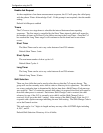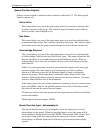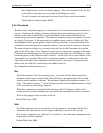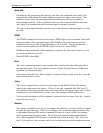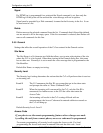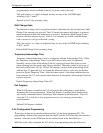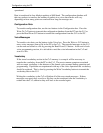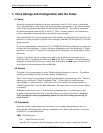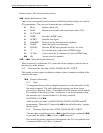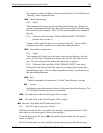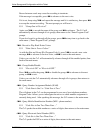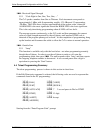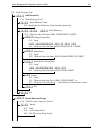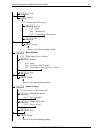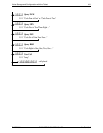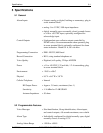
Voice Storage and Configuration with the Telset 4-2
B1272M001
BARNETT ENGINEERING LTD. ProTalk Cv2
directory menu. The choices at this point are:
0UU - Speak the Directory Codes
These codes correspond to buttons found in the Directory Editor dialog box used for
PC programming. They are used to enter the new configuration.
#0 DIAL Initiate a phone call
#1 WAIT Measured in seconds with a maximum value of 255
#2 AUTO ACK
#3 DTMF Send the a DTMF string
#4 ALERT Send the alert signal
#5 ANSWER Wait for answer detection before speaking
#6 VOICE Speak the stored voice messages
#7 SIGNAL Send the DTMF string entered in Points - no voice
#8 ‘!’ Two second delay used in dial or DTMF strings
## ‘#’ Char Used to enter the ‘#’ character in a dial or DTMF string
UU OK Accept or end of sequence
1UU ... 6UU - Select the required directory
When a directory is selected the Cv2 speaks the current settings for the first line in
the directory in this manner:
Cv2: “Directory One Line One is DIAL 2559544 WAIT 3 VOICE”
This setting can be accepted or edited according to these commands available in the
directory sub-menu:
2UU Change current entry
Cv2: “beep”
To change the directory line, a complete sequence of codes and values for the
line must be entered. The codes defining the activities are those shown
previously as Directory Codes. A maximum of 250 keystrokes can be entered.
For example, if the setting for line 1 in directory 1 was to be changed so that
the wait time was 5 seconds instead of 3, the entry would be:
#0 2559544 #1 5 #6 UU
which would be the same as [DIAL]2559544 [WAIT]5 [VOICE] in the PC
programming. When the Cv2 detects the UU at the end of the entry, it speaks
the new entry.
Cv2: “Directory One Line One is DIAL 2559544 WAIT 5 VOICE”
You can either accept the new entry (UU), repeat the change command (2UU)
or use either the delete (3UU) or insert (4UU) functions.
If an invalid keystroke is detected in the sequence, the Cv2 will speak the line
as entered with the word “Error” at the end.



